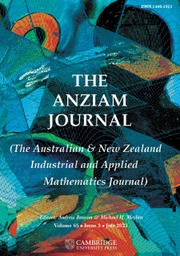Article contents
On wave motion in a two-layered liquid of infinite depth in the presence of surface and interfacial tension
Published online by Cambridge University Press: 17 February 2009
Abstract
In this paper various two-dimensional motions are determined for waves in a stratified region of infinite total depth with a free surface containing two superposed liquids, allowing for the effects of surface and interfacial tension. The fundamental set of wave-source potentials for the two layers is used to construct the set of slope potentials that produce discontinuous free-surface and interface slopes. The latter potentials are then utilized to obtain the potentials for waves due to both heaving vertical plates and incident progressive waves against a vertical wall. The underlying assumption of small time-harmonic motion pertains, described by a pair of velocity potentials for the two layers satisfying coupled linearized boundary-value problems, and all solutions are obtained in terms of their matching basic solutions. The technique for applying Green's theorem in the two layers is developed for use with the wave-source potentials, which themselves are found to obey a generalised reciprocity principle. Familiar results for a single liquid of infinite depth are hereby extended, but the new feature emerges of there being two types of progressive waves in all solutions. For ease of presentation the solutions are obtained for a particular relationship between surface and interfacial tension.
- Type
- Research Article
- Information
- Copyright
- Copyright © Australian Mathematical Society 1994
References
- 10
- Cited by


